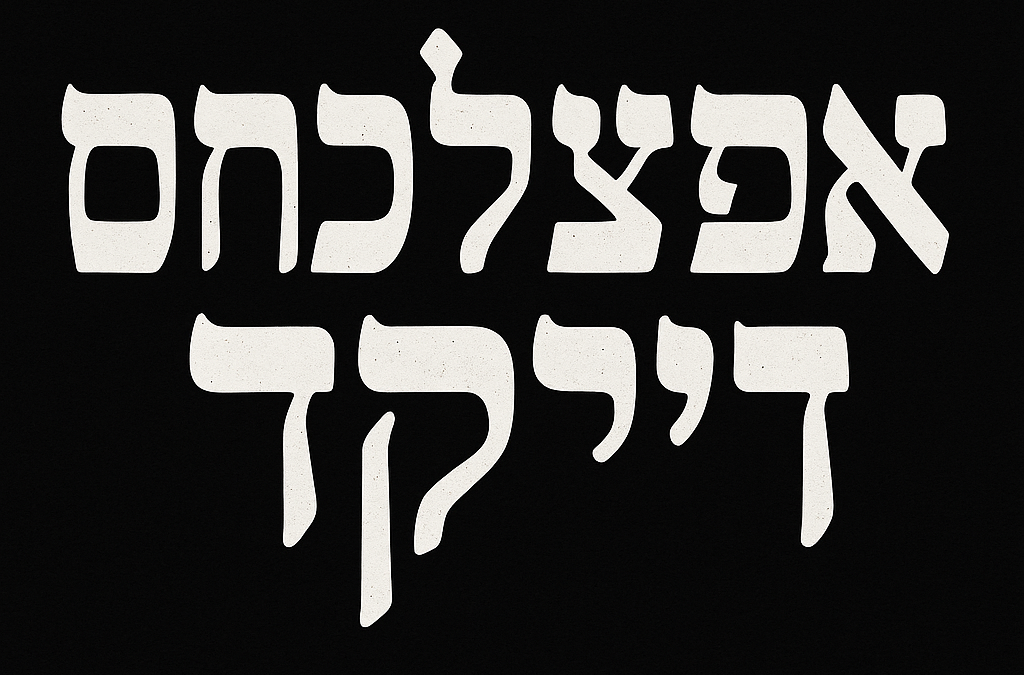Aptziloches Diker: Finding Myself in an Unexpected Word
When I first started watching The Devil Next Door on Netflix, I thought I knew what I was getting into.
The story was heavy, of course — it had to be — about John Demjanjuk, an aging Cleveland man accused of being “Ivan the Terrible,” one of the most brutal guards at the Treblinka death camp during the Holocaust.
The courtroom scenes were intense. Survivors gave tearful testimony. Evidence blurred with memory, and memory blurred with time. And then there was Yoram Sheftel — the brash Israeli defense attorney who took on the task of defending Demjanjuk when few others would.
Sheftel stood out immediately.
Not just because of his arguments, but because of his personality.
He was fiery, argumentative, combative even — not in a reckless way, but in a deliberate, strategic one.
And at one point, describing himself, he used a Yiddish expression that made me freeze.
“Aptziloches Diker.”
אַפּצילוכעס דיקער
He explained it proudly: a person who refuses to go along with the crowd.
A contrarian by nature.
A troublemaker — but not just for the sake of making trouble.
Someone who almost instinctively resists the flow when they sense something is wrong, when they feel that just nodding along would betray something deeper inside them.
I paused the film and sat there, letting it settle.
I’ve never called myself a troublemaker.
I don’t go looking for fights.
But as I thought about the recent chapters of my own life — especially painful ones involving leadership, conflict, and standing firm when it would have been easier to just give in — I realized that maybe that word fit me better than I wanted to admit.
I’ve been in rooms where silence would have preserved relationships, but speaking up felt necessary.
I’ve been in conversations where going along would have kept the peace — but something inside me burned too brightly to let it happen.
I have wrestled with the tension between unity and integrity — and I know that sometimes, no matter how carefully you tread, choosing integrity comes with a price.
In the documentary, Sheftel embraced being an aptziloches diker as part of his defense strategy — he needed to stir discomfort, to refuse the easy path, to confront assumptions and force people to see what they did not want to see.
And while the stakes in my life are not a historic international trial, the feeling resonated: that sense that going along quietly would betray something bigger.
But even as I recognized myself in the term, I felt a warning embedded in it too.
Resistance for the sake of resistance is no virtue.
Contrariness without wisdom can wound more than it heals.
The same stubbornness that guards the truth can just as easily guard pride.
The same refusal to bend can protect something good — or isolate you if it’s misdirected.
Being an aptziloches diker — being someone who resists, pushes, questions — can be a gift.
It can protect the fragile beauty of truth when it’s under pressure.
It can carve out spaces for honesty when conformity would erase it.
But it has to be shaped.
Directed.
Rooted not in ego, but in love.
I don’t think I ever chose this part of myself consciously.
It’s just… there.
It shows up when the easy way feels wrong.
It rises up when silence feels like complicity.
Today, I don’t reject it, and I don’t celebrate it blindly.
I just recognize it — and I ask God to shape it.
If being an aptziloches diker is part of who I am,
then I want to be the kind that fights for good — not for attention, not for self-justification, not for bitterness.
I want to be the kind who stands when it matters, and who also knows when to step back, listen, and yield.
There’s a fine line between courage and stubbornness.
I’m praying to stay on the right side of it.
Closing Reflection
Let my refusal to conform serve truth, not pride.
Let my fire defend the broken, not burn the bridge.
Let me be a rebel when it honors You — and gentle when it builds peace.
Teach me when to resist, and when to surrender.
Make even my stubbornness something holy.


